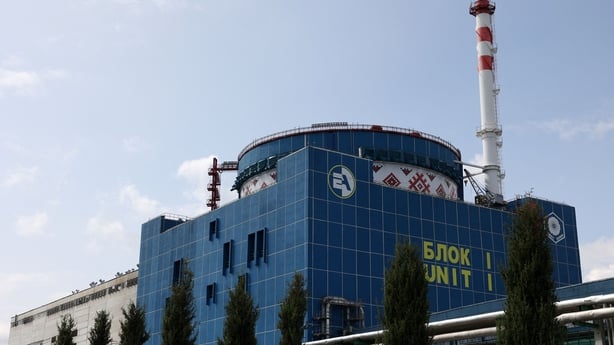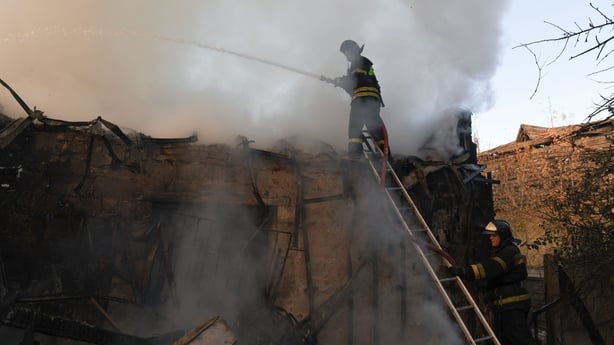Russia is executing soldiers who try to retreat from a new offensive in eastern Ukraine and has suffered "significant" losses of armour and personnel, the White House has said.
"We have information that the Russian military has been actually executing soldiers who are refusing to follow orders," National Security Council spokesman John Kirby told a briefing.
"We also have information that Russian commanders are threatening to execute entire units if they seek to retreat from Ukrainian artillery fire," he added.
"It's reprehensible."
Mr Kirby did not give further details when asked about the alleged executions or how the United States had obtained the information.
Russia has stepped up attacks near the town of Avdiivka in Ukraine's eastern Donetsk region and the northeastern city of Kupyansk in a bid to move the front line forward before winter.
Moscow has suffered "significant losses" in the offensive including at least 125 armoured vehicles and "thousands" of casualties, Mr Kirby said.
"The Russian military appears to be using what we would call human wave tactics," he said.
"It is unsurprising that Russian forces are suffering from poor morale."
Earlier today Ukrainian President Volodymyr Zelensky said a Russian drone attack in the western Khmelnitskyi region had probably targeted the area's nuclear power station.
The attack shattered windows at the plant and injured 20 people.
The International Atomic Energy Agency, the United Nations' nuclear watchdog, said blasts from the drone attack did not affect the plant's operations or its connection to the grid.

Power was temporarily cut to some off-site radiation monitoring stations.
In his nightly video address, Mr Zelensky said the attack provided yet more evidence that tougher sanctions were needed against Russia.
"It is most likely that the target for these drones was the Khmelnitskyi nuclear power station.
"The shock wave from the explosion shattered windows, including on the nuclear power station's premises".
He added that every Russian strike, "especially those daring enough to target nuclear power stations and other critical facilities, serves as an argument that pressure on the terrorist state is insufficient."
Regional governor Serhiy Tyurin gave a more complete picture of the extent of the damage, saying more than 1,700 buildings sustained damage.
Mr Tyurin, in a statement posted on Telegram, said these included 282 apartment blocks, more than 1,400 private homes, 41 educational institutions and six healthcare buildings.
IAEA Director General Rafael Grossi said: "The fact that numerous windows at the site were destroyed shows just how close it was. Next time, we may not be so fortunate."
Ukraine's air force destroyed all 11 Russian drones launched overnight, the military said. Damage was caused by blast waves and falling debris, according to the interior minister.
"At night, the enemy struck territory near the Khmelnytskyi nuclear power plant. As a result of the explosion, windows in administrative and laboratory buildings have been damaged," the Energy Ministry said on the Telegram messaging app.
Power lines were also damaged, it said, with more than 1,800 consumers in the adjacent towns of Netishyn and Slavuta facing power cuts.
In Slavuta, 20 buildings were damaged, including a building used by a fire and rescue unit and another by a police department, Interior Minister Ihor Klymenko said on Telegram.
The town's mayor, Vasiliy Sydor, said 20 people were hurt.
Reuters was not able to verify the reports.
The Khmelnytskyi region has regularly been a target of attacks by Russian drones and missiles, which analysts link to a military airfield in the region.
Ukraine's five nuclear power stations have been a point of contention during the 20-month Russian invasion.
Russia has occupied the Zaporizhzhia nuclear plant, Europe's largest such facility, since early in the conflict and each side has since routinely accused the other of planning to shell or attack the site.

Over the past two weeks, Russia has concentrated on Avdiivka in Donetsk, a town known for its big coking plant and now seen as a bulwark of Ukrainian resistance.
"The enemy is trying to move forward and then we beat them back," Oleksandr Shtupun, a spokesperson for Ukraine's southern groups of forces, said on national TV.
"So by no means can you speak of a fixed situation of some sort. Heavy fighting is continuing, though activity has subsided somewhat. The enemy is going through some kind of regrouping."
Russian forces were relying on infantry, using small assault groups of 30 to 40 men, Mr Shtupun said, giving Russia's losses in the last six days as 2,500 dead and wounded in the area.
"This is quite significant even for Russia, bearing in mind that they do not look after their own men".
Vitaliy Barabash, head of Avdiivka's military administration, said Russia was applying pressure from the north but was unable to get past a rail line under Ukrainian control.
He also dismissed reports that Russian troops had secured control of one of the large slag heaps dominating the town's industrial landscape.
"They put up flags there and tried to make some kind of spectacle," Mr Barabash said.
Valeriy Prozapas, a Ukrainian captain, told Espreso TV that the Russians were acting to exploit the fact that Avdiivka was "de facto half surrounded".
"The second issue is political. They have little to be proud of and have to sell to their population some sort of victory, even if it is only an interim one".
Ukraine's counteroffensive, launched in June, has resulted in the capture of villages in the east and some settlements in the southern sector, but the pace is far slower than last year's advance through the northeast.
Russian accounts of the latest fighting made no mention of Avdiivka, but said Russian troops had repelled 15 Ukrainian attacks near Kupiansk, farther north.
Ukrainian officials also acknowledged heavy fighting near Kupiansk, a town initially seized by troops but taken back by Ukraine in last year's rapid advance through the northeast.
Authorities in the Kharkiv region said they were imposing a mandatory evacuation of families from 10 localities in the area.
Reuters could not independently confirm the battle reports from either side.

